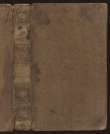You are here
قراءة كتاب A Residence in France During the Years 1792, 1793, 1794 and 1795, Part II., 1793 Described in a Series of Letters from an English Lady: with General and Incidental Remarks on the French Character and Manners
تنويه: تعرض هنا نبذة من اول ١٠ صفحات فقط من الكتاب الالكتروني، لقراءة الكتاب كاملا اضغط على الزر “اشتر الآن"

A Residence in France During the Years 1792, 1793, 1794 and 1795, Part II., 1793 Described in a Series of Letters from an English Lady: with General and Incidental Remarks on the French Character and Manners
and the most trifling actions of his life recorded, it would be deemed unfair and illiberal, and he who should practice such meanness would be thought worthy of no punishment more respectful than what might be inflicted by an oaken censor, or an admonitory heel.—But it will be said, a King is not an individual, and that such a habit, or such an amusement, is beneath the dignity of his character. Yet would it be but consistent in those who labour to prove, by the public acts of Kings, that they are less than men, not to exact, that, in their private lives, they should be more.—The great prototype of modern satyrists, Junius, does not allow that any credit should be given a Monarch for his domestic virtues; is he then to be reduced to an individual, only to scrutinize his foibles, and is his station to serve only as the medium of their publicity? Are these literary miners to penetrate the recesses of private life, only to bring to light the dross? Do they analyse only to discover poisons? Such employments may be congenial to their natures, but have little claim to public remuneration. The merit of a detractor is not much superior to that of a flatterer; nor is a Prince more likely to be amended by imputed follies, than by undeserved panegyrics. If any man wished to represent his King advantageously, it could not be done better than by remarking, that, after all the watchings of assiduous necessity, and the laborious researches of interested curiosity, it appears, that his private life affords no other subjects of ridicule than, that he is temperate, domestic, and oeconomical, and, as is natural to an active mind, wishes to be informed of whatever happens not to be familiar to him. It were to be desired that some of these accusations were applicable to those who are so much scandalized at them: but they are not littlenesses—the littleness is in him who condescends to report them; and I have often wondered that men of genius should make a traffic of gleaning from the refuse of anti-chambers, and retailing the anecdotes of pages and footmen!
You will perceive the kind of publications I allude to; and I hope the situation of France, and the fate of its Monarch, may suggest to the authors a more worthy employ of their talents, than that of degrading the executive power in the eyes of the people.


